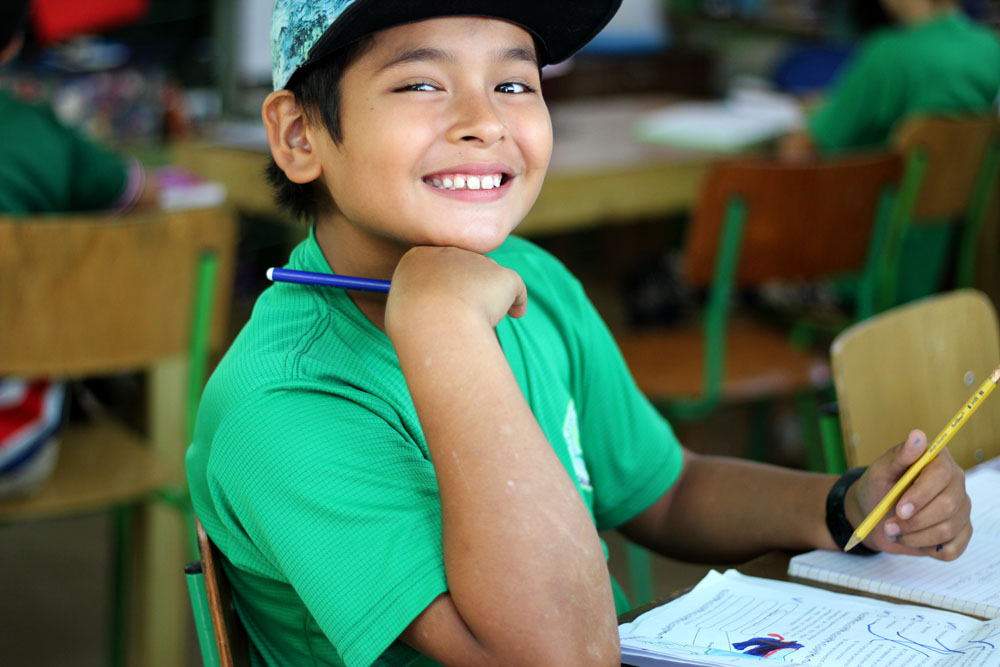
by Lural Ramirez | Oct 10, 2018

With the 2018 school year coming to an end and the 2019 school year already taking shape in the minds of the Futuro Verde leadership team, teachers and current and future parents, I share with you some interesting facts regarding enrollment projections for the coming year! Please note that there are still three months of time remaining for families to enroll students and we usually have significant increases in enrollment over that period of time. Numbers shared today are current to the first week of November.


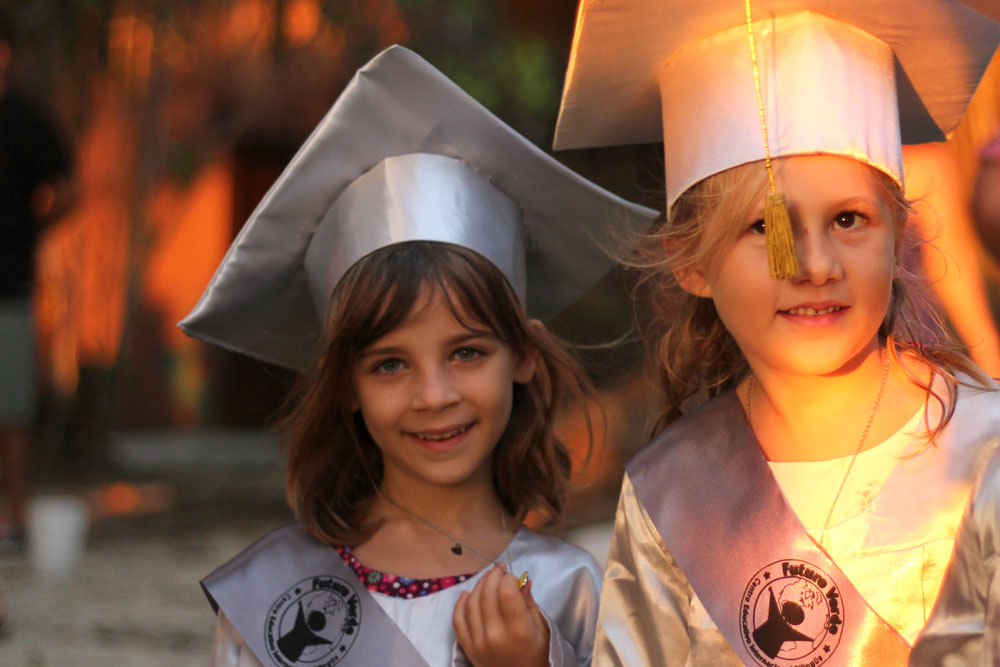
by Lural Ramirez | Sep 20, 2018

For the last few weeks Futuro Verde parents have had the opportunity to give their invaluable feedback to the Futuro Verde leadership team regarding different aspects of our school. Huge appreciation to all of our families who responded. We had a great turn-out, with respondents from all different cultural backgrounds, native languages, years with the school and with students from every grade level. We appreciate and value your feedback and will take to heart all of your suggestions and comments- Thank you!
Some of the survey results have guided important decisions we have been pondering as a staff. Today, I would like to specifically share with you the results regarding our structure for graduations.
Parents were asked to share their feedback on the level of event we hold for the different graduation levels (Prepa,6th, 9th and 12th grades). Well, the results are in and the survey shows that 56% of Futuro Verde parents prefer a change in the way we have traditionally done graduations. A group of leadership team members, teachers and parents will work to finalize details, but I can share with you today that we will be making the following changes to our graduation structure from this year on:
For Prepa and 9th grade, graduation acknowledgement will be integrated into our festivities during RAP each year. Prepa students will also hold a celebration in their classroom to acknowledge this important change of grade level.
For 6th grade, graduation will happen at Futuro Verde each year. We will hold the graduation on campus, with beautiful decorations and a formal ceremony. This ceremony will be held the second day of conferences as a late afternoon event. This year’s event will be held at 5:00 pm on Friday, December 14th.
There will be no high school graduation event this year, as our current 11th graders will become our first class of 12th graders in 2019. Next year, and from then on out, 12th graders will have an off-campus formal graduation ceremony that will incorporate both the IB and MEP diplomas earned at the end of 12th grade.
This new graduation structure reflects the wishes of a majority of our school community and we are excited to modify our structure in order to make it the most meaningful and appropriate for each graduating class. Again, thank you for your feedback and suggestions!
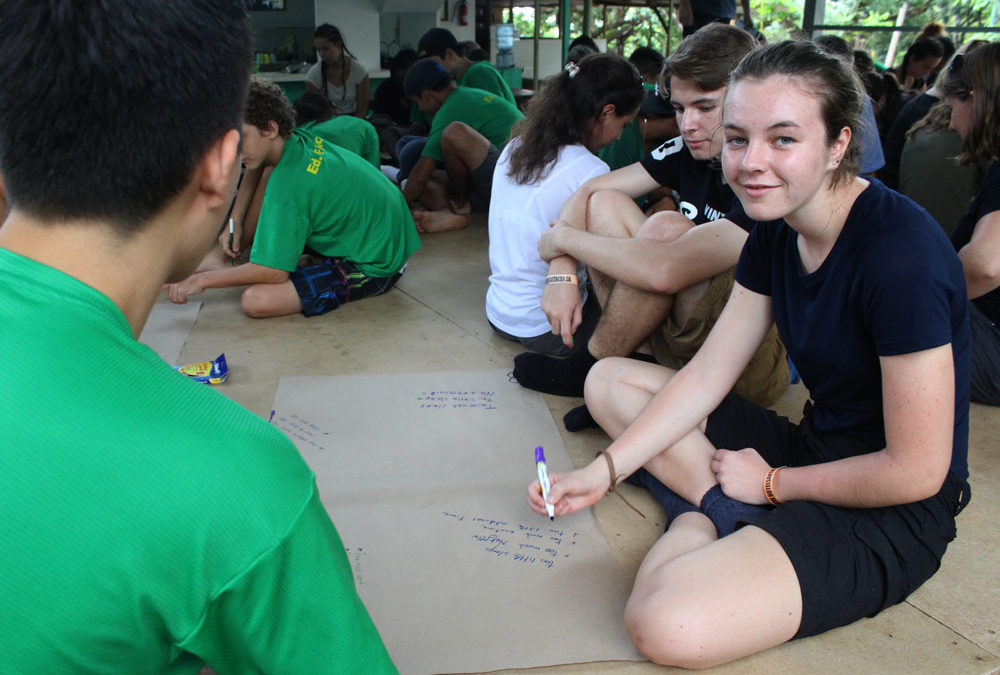
by Katie Chiaverini | Sep 11, 2018
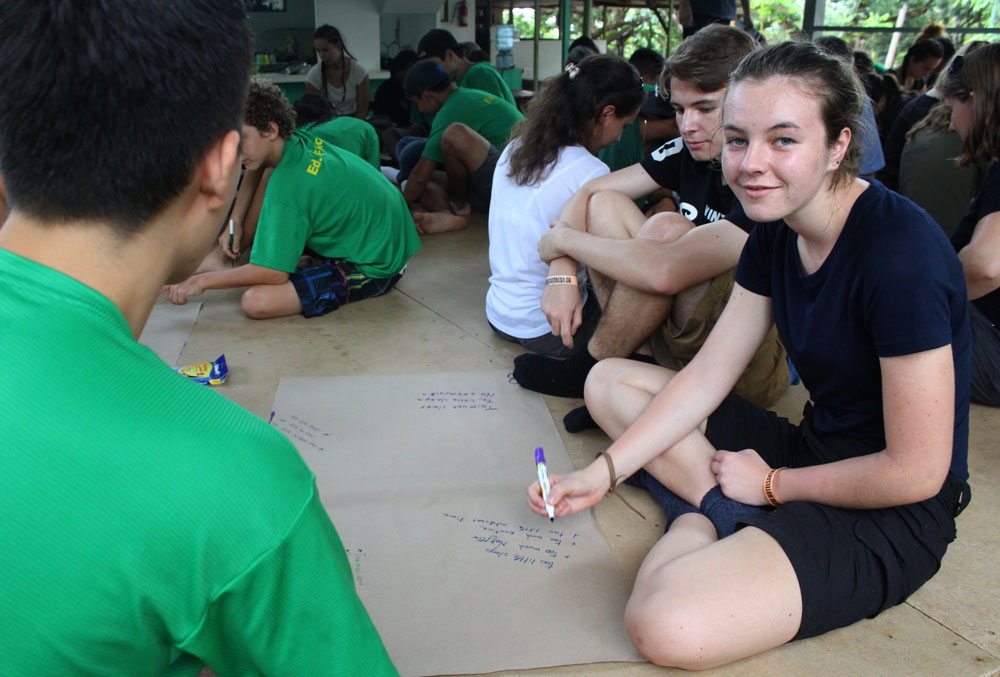
The week of October 21st Futuro Verde will give a big welcome to the International Baccalaureate students from Jersey Island, part of the Channel Islands. This group of 7 high school students attend Hautlieu School and participate in the IB Diploma Program. They take a trip to Costa Rica as part of the CAS (Creativity, Action, Service) program, an integral part of the International Baccalaureate Diploma Program. Their visit reaps benefits for all as it is a great opportunity for our students to make meaningful global connections with students from afar.
Futuro Verde IB students also participate in the CAS program, so this is a great opportunity for our student community to learn from other students’ experiences.
We are lucky to have this sustained cultural interaction which also helps further develop the CAS objectives, three in particular:
- explore new possibilities, embrace new challenges and adapt to
new roles
• purposely reflect on their experiences.
- understand they are members of local and global communities
with responsibilities towards each other and the environment.
Jersey students and Futuro Verde students collaborating is a perfect example of a global community coming together to take action towards a common goal. This is how it all starts…the Futuro Verde administration team works ahead of time through email and Skype to connect with lead teachers from the partner school. They identify specific needs for Futuro Verde and the student body at that time. The service project ideas stem from these needs. The Jersey Island students then have the opportunity to interact with FV students pre-K through Colegio to create solutions to the identified needs, which involves hands-on experiences as suggested by CAS.
Past projects have included a range of focus areas from environmental education to specific academic needs. For example, one year the students participated in a beach cleanup with the purpose of collecting plastic to create murals with Colegio students to beautify our campus and also collected items to use for math manipulatives for younger students. Usually students are divided into three groups to focus on three different projects to make the most of their time and offer more direct interactions with our students. We are excited to see what projects will take place this year to enrich our students’ lives and improve our school.
The Hautlieu school, now on their fourth year visiting our school stay in Costa Rica for several weeks volunteering on several service projects, including orphanage work, Only Love preschool, and other activities. The students are also able to enjoy the beautiful diversity of Costa Rica with leisure activities, like hiking and visiting various tourist destinations – allowing them to see different aspects of the country.
Reflection and personal growth are at the heart of the CAS program, which is very holistic in nature. In the past, teachers and administrators who have worked with Hautlieu students have noticed changes in perspective just within the time frame they spend at our school. One of the positive things they mention is the connections they see between Futuro Verde students and teachers, starting with our lunch arrangement where we all eat together and are able to build and strengthen relationships in this way. Futuro Verde students comment that it is always interesting to learn about someone else’s culture and how this impacts their perspective. This year’s visit with the Jersey Island students will be yet another opportunity to open our minds to a new experience and grow as individuals.
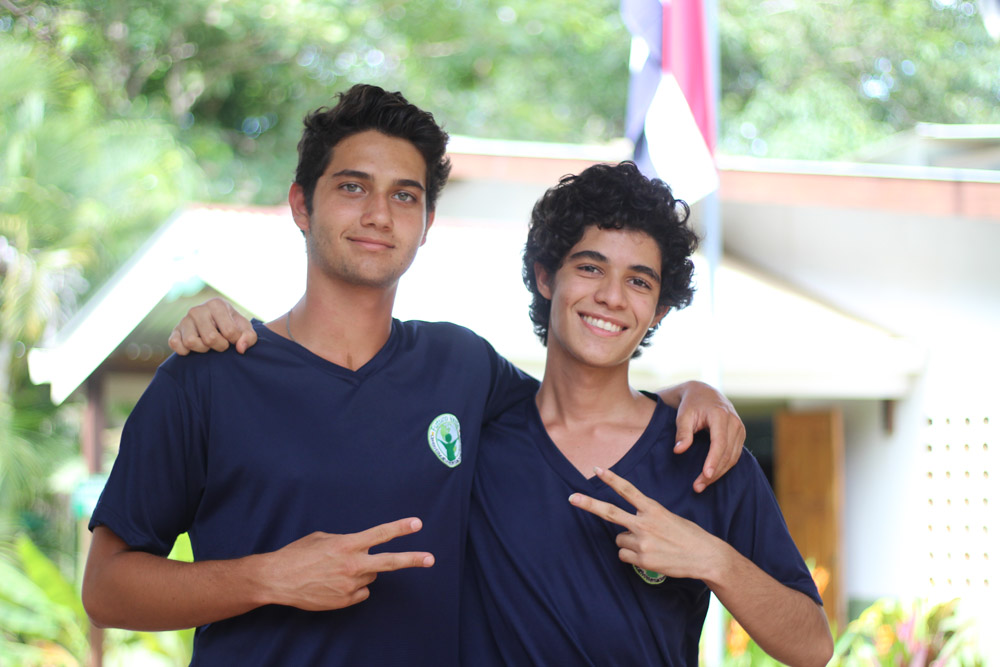
by Lural Ramirez | Aug 31, 2018

All year long we have been celebrating our 10th anniversary as a school, years that have brought impressive changes and accomplishments. 2019 is right around the corner and we are thrilled to soon be adding in the 12th grade year to our currently pre-school through 11th grade school!
In 2019 Futuro Verde will boast the following levels:
- Preschool Department: two classrooms and two teachers, one native-English speaker and one native-Spanish speaker
- Preeschool:
- prekinder, 3 years old by Feb. 15
- kinder, 4 years old by Feb. 15
- Prepa
- prepa, 5 years old by Feb. 15
- Primary School: six grades, 1st through 6th grade. Students have two teachers, one native-English speaker and one native-Spanish speaker. Teachers are paired together at two grade levels (1st and 2nd, 3rd and 4th, and 5th and 6th), so your child could have the same set of teachers for two years in a row.
- Middle School: 7th and 8th grades in 2019 will have a slightly gentler introduction into our secondary program. Middle schoolers work with slightly fewer teachers than their high school counterparts, but still move into a secondary model by travelling from class to class and beginning to have electives to choose from.
- High School: 9th through 12th graders make up our high school program.
- 9th and 10th grades are the introduction to high school and a time when students transition into a more rigorous curriculum. 10th graders start a service class, called pre-CAS that prepares them well for the IB program to come and begin to worry about their GPAs and start to make post-secondary plans.
- 11th and 12th grades make up our International Baccalaureate (IB) Diploma Program (DP). A two-year program, students take social studies and civics MEP exams in 11th grade and IB exams over the course of the two years, with final IB exams toward the end of year two of the program. Successful 11th and 12th graders have the opportunity to earn both the MEP diploma AND the IB diploma! Emphasis is placed in the IB DP on confirming post-secondary plans and preparing for life as young, independent citizens of the world.
As you can see, 12th grade completes the Futuro Verde continuum education! As an IB World School we take the concurrency of learning across grade levels seriously and we are proud to make 2019 the year our school is finally complete!

by David Brookshire, MPH/ School Counselor & Special Education Case Manager | Aug 30, 2018

Empathy is a complex skill that involves understanding another person’s perspective and responding appropriately. This skill grows to become the foundation of how we learn to interact with others in an effective way and can determine the quality of relationships we build throughout our lives. Needless to say, it’s important. We all want our children to grow up as caring, considerate, and understanding human beings. So, how can we help them become this? Here are a few tips for developing caring and empathetic children:
1. Model:
One of the best ways for children to learn anything is through modeling. Quite simply, when they observe someone modeling a particular behavior, they are much more likely to learn and repeat that behavior. Parents can model empathy by verbalizing their understandings of others’ feelings in various situations. For example, if your child is crying, you can say, “I see that you are crying. It seems like you are sad. Are you sad? I know it’s hard sometimes.” These few short sentences validate the child’s perspective and verbalize the connections between their thoughts, feelings, and behavior. Providing them an experience where someone shows them empathy helps them build those pathways in the brain. This is important to do for them and can also be demonstrated in situations involving others’ feelings.
2. Make connections through observation:
In any public or family situation, you can point out situations where a person is behaving in a certain way and ask your child if they have any guesses for why they might be doing what they are doing. For example, “Why do you think that man is yelling?” If he or she doesn’t know you can discuss different possibilities and connect it with how we act when we are feeling a certain way. Another way to practice this type of perspective taking is to apply this to any conflict the child might have. For example, if she hits her brother, you can ask her how she thinks her brother feels when she hits him. A follow up question would be, “How do you feel when your brother hits you?” This type of dialogue is great for empathetic brain development and a great way to practice the Golden Rule (Treat others the way you would like to be treated.). Practicing this type of perspective taking at home, in public, and even through literature by discussing the characters, can be a great way to make connections through observation in order to develop empathy skills.
3. Listening and vulnerability:
Through interactions, we learn and practice empathy. One of the best ways to do this is by being a good listener. Allowing others to fully express their perspective naturally helps us to understand this perspective. This, of course, requires us to express our perspective appropriately when it is our turn to do so. This requires vulnerability and honesty as we express how we are feeling. This is one of the best ways we can model and practice empathy with our children.
4. Unplug:
If building empathy skills requires interaction with others, it is absolutely essential that we limit electronic screen time for ourselves and our children. If most of our free time is spent staring at our respective screens, this obviously reduces that amount of time we are interacting with others. This is only the tip of the iceberg, however. Studies show that too much time on electronics for developing brains can cause such problems as irritability, insomnia, poor social skills, poor memory, difficulty focusing, poor eye contact, impulse control, and disorganized behavior. Dr. Victoria Dunckley explains in her book, Reset Your Child’s Brain, that a child’s brain that is overly engaged in electronic screen time creates imbalances in the brain by providing too much activity in the reward centers and too little activity in regions associated with empathy. By substituting screen time for family game time, a leisurely walk, conversation, or other activities, you can have a major impact in building connection, modeling social interaction, and strengthening brain development.
By incorporating these strategies, you are well on your way to developing caring and empathetic children.
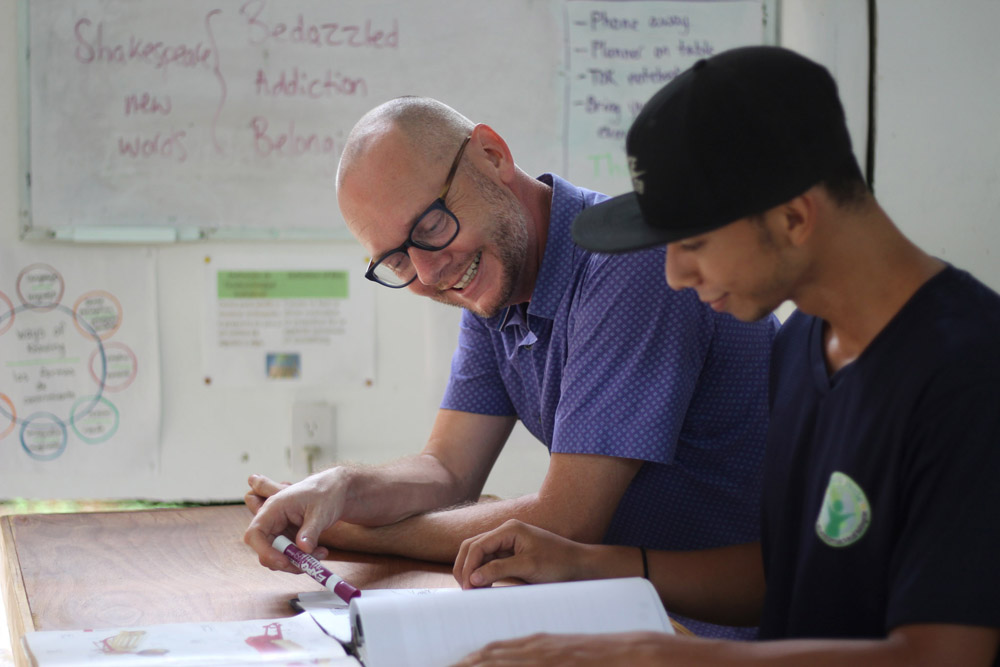
by Stuart Millar, IB coordinator | Aug 29, 2018

While we excitedly await the arrival of our new high school and IB English teacher, Vidhi Gada, I have been the substitute teacher for our 11th-grade students. Often we teach what we already know, but I think I have the most fun when I learn with the students. Did you know that Shakespeare invented countless words and phrases that we use in English? 1,700 words actually, and countless was one of them. You just can’t get “too much of a good thing!” (Shakespeare). I feel the same teaching Business Management. It has re-awakened my passion for the subject and I find myself spending hours reading the business news and researching company statistics. It’s all worth it when you see students light up and get involved with their learning as well. Show them how to learn, model how to learn, and most importantly model how fun it is to learn.
We have made an auspicious (thanks Shakespeare!) start to our IB program. We’re learning so much and learning together – not just facts and figures, but about ourselves and each other. Students continue to learn how to research, how to write according to the MLA style guide, and to question not only their sources but what they think they know or believe. They are starting to plan their Extended Essay as well as their Creativity, Activity, and Service (CAS) project, and have already completed some IB Internal Assessments which will contribute to their final grade. Oh! And we’re talking about university applications as well!
With so much going on we are all learning something else that is very important. Organizing their priorities and time will be the key to our students’ success. There is a lot to do in IB. There is no getting away from that. It is a rigorous program of study and makes a lot of demands on students. An important realization must be that classwork and homework is not optional and deadlines are not suggestions! Some might have to adapt their outlook and how they use their time. For example, the weekend can still be a time for relaxation and fun, but sometimes it’s not. What I have seen so far is that those who put in the time and effort are really moving forward and making big gains.
So students, dig deep, be resilient, accept that it’s important to do your best work, stay up to date, and don’t forget to ask for help and support. We’re here for you! The IB diploma program is about many things, including building character and developing lifelong learning skills. It’s also about scoring as high as possible to give yourself as many opportunities as possible in the future. You can do it!










